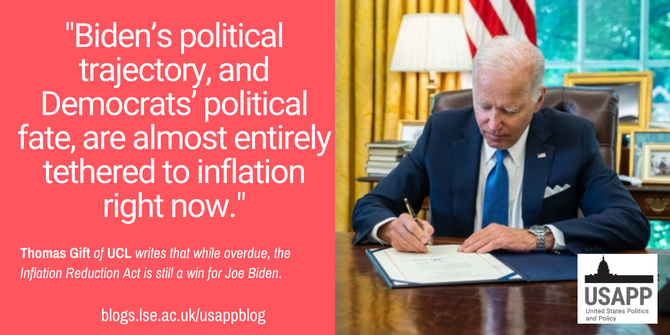 Over the weekend, President Joe Biden drew one step closer to signing the Inflation Reduction Act, a landmark bill that would reform corporate taxes and provide $433 billion in new spending for climate and healthcare. In a party-line vote, Senate Democrats approved the legislation through the special budget reconciliation process, setting the stage for final passage in the House later this week. In this Q&A, Thomas Gift discusses the significance of the bill, how the negotiations unfolded, and how it might affect the 2022 primaries.
Over the weekend, President Joe Biden drew one step closer to signing the Inflation Reduction Act, a landmark bill that would reform corporate taxes and provide $433 billion in new spending for climate and healthcare. In a party-line vote, Senate Democrats approved the legislation through the special budget reconciliation process, setting the stage for final passage in the House later this week. In this Q&A, Thomas Gift discusses the significance of the bill, how the negotiations unfolded, and how it might affect the 2022 primaries.
Will the Inflation Reduction Act pass? How significant would it be for Biden?
Barring something unforeseen, the Inflation Reduction Act will pass the House. But the path to Senate approval wasn’t easy. First, the challenge was getting moderates Joe Manchin and Kyrsten Sinema on board, both of whom expressed concerns over key provisions of the bill. Then, it was getting the green light from the Senate parliamentarian, who had to qualify the legislation to be passed through a special process known as budget reconciliation. Finally, the task was surviving the all-night Senate “vote-a-rama”, where amendments to the legislation were offered by Republicans and Democrats alike. But when it’s all said and done, Democrats will have a significant piece of legislation. Key provisions include a 15 percent minimum corporate tax, Medicare with the power to negotiate prescription drug prices, and big tax credits for firms aimed at limiting carbon emissions. For the White House, it’s not Build Back Better, and some progressives like Bernie Sanders are already calling it inadequate. But Biden will take the win.
What’s your key take-away from how the negotiations unfolded?
The real story of the Inflation Reduction Act is why a similar deal wasn’t struck months ago. Everyone knew (or should’ve known) Joe Manchin was never going to get to “yes” on $2 trillion of spending for Build Back Better. The White House’s error was reaching for an historic bill with a huge price tag when it could have achieved a series of more incremental victories with much the same effect. And let’s be honest: $433 billion in new federal outlays is not a small bill. Only by Washington’s modern standards of decadence could it be considered modest. So, this is a win for Biden. But it’s a win that the president could have potentially secured earlier if he’d shown more leadership in standing up to progressives clamoring for more spending. A central complaint against Biden is that he hasn’t been able to broker more deals, despite his own party holding a majority in Congress. Setting more realistic goals earlier could have changed the narrative of this administration and given it more momentum for tackling other domestic priorities.

“P20220624AS-0754” by The White House is United States government work
Will the bill help Democrats heading into the midterms?
Biden’s political trajectory, and Democrats’ political fate, are almost entirely tethered to inflation right now. Until Americans see relief from historic spikes in prices, it’s hard to envision the party significantly over-performing in the midterms. The Inflation Reduction Act does give Democrats a major piece of legislation to campaign on. But according to non-partisan analyses from both the Congressional Budget Office and the Penn Wharton Budget Model, its impact on consumer prices over the next several years is estimated to be about zero. I also think Democrats risk Americans saying to themselves: “This is the same White House that told us months ago that inflation was going to be temporary. Why should we believe Biden now?” That’s apart from the fact that most benefits from the Inflation Reduction Act won’t transpire for years. Democrats are in a better position today than a few weeks ago. But I’m skeptical that one piece of legislation is going to change the basic narrative of how voters behave in November.
On the other side of the aisle, Donald Trump just won Saturday’s presidential straw poll at the Conservative Political Action Committee (CPAC) meeting. What does that say about MAGA candidates heading into the midterms?
CPAC, of course, isn’t a total reflection of where the Republican Party stands at this point. But Trump’s win — beating Florida Governor Ron DeSantis with more than two-thirds of the vote — is still notable. Yet it’s not just one straw poll. We’re seeing “ultra-MAGA” candidates oust establishment Republicans in primaries all across the country. That’s a trend. And it just confirms what many Democrats don’t want to hear, but need to grasp: Trumpism isn’t even close to reaching its political demise. This doesn’t mean that MAGA candidates will win in November. It also doesn’t mean that the probabilities are in their favor. But in my view, discounting the potential for these ostensibly fringe Republicans to get elected is a mistake because, within today’s Republican Party, they’re not fringe. What’s especially worrying is reports of liberal activists working to prop up MAGA candidates in Republican primaries, expecting them to be weaker general election opponents. That’s playing with fire—and a strategy that Democrats may live to regret.
- These remarks are based in part on an interview by Thomas Gift for CNN on Aug. 7, 2022.
Please read our comments policy before commenting.
Note: This article gives the views of the author, and not the position of USAPP – American Politics and Policy, nor the London School of Economics.
Shortened URL for this post: https://bit.ly/3A6xjdd
About the author
 Thomas Gift – UCL
Thomas Gift – UCL
Thomas Gift is Associate Professor of Political Science at UCL, where he is director of the Centre on US Politics (CUSP).






